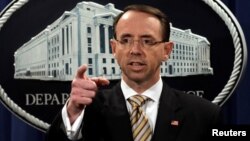Under Attorney General Jeff Sessions, the U.S. Justice Department has buried a host of Obama-era policies it sees as detrimental to law enforcement.
But there is at least one little-known initiative undertaken by the Obama administration that the nation’s top law enforcement agency has kept alive: a pilot program designed to encourage companies to voluntarily disclose paying bribes to foreign officials.
Launched in April 2016, the program promised substantially reduced penalties to U.S. and foreign companies that voluntarily disclose foreign bribing, cooperate with the Justice Department and take remedial actions.
Continuing program
On Wednesday, Deputy Attorney General Rod Rosenstein, the department’s No. 2 official, announced a revised version of the policy, effectively making it permanent and incorporating it into the manual used by the country’s 93 U.S. attorneys.
“We analyzed the Pilot Program and concluded that it proved to be a step forward in fighting corporate crime,” Rosenstein said at the 34th International Conference on the Foreign Corrupt Practices Act in Oxon Hill, Maryland.
“The incentive system set forth in the Department’s FCPA Pilot Program motivates and rewards companies that want to do the right thing and voluntarily disclose misconduct,” he said.
The program aims to enhance enforcement of the Foreign Corrupt Practices Act, the main anti-corruption law in the U.S. that makes it a crime to pay bribes to foreign officials.
The Department of Justice and the Securities and Exchange Commission (SEC) are jointly responsible for enforcing the law.
Law applies to US, foreign companies
The law applies to American businesses as well as foreign companies listed on U.S. stock exchanges.
The revised policy keeps the pilot program largely intact with one significant tweak. Under the pilot program, prosecutors had discretionary authority whether to bring charges against companies that self-disclose; the new policy says there will be a “presumption” that the Justice Department will not pursue charges.
The program also promises companies that meet its standards of self-disclosure and cooperation a 50 percent reduction in fines imposed under U.S. Sentencing Guidelines.
Self-disclosures
While some companies have always voluntarily disclosed foreign bribery to government agencies, the incentive program has accelerated the pace of self-disclosures, Rosenstein said.
In the 18 months since the program’s launch, voluntary self-disclosures of foreign bribery have jumped more than 50 percent, from 18 to 30, Rosenstein said.
“We expect the new policy to reassure corporations that want to do the right thing,” he said. “It will increase the volume of voluntary disclosures, and enhance our ability to identify and punish culpable individuals.”
Enforcement actions under FCPA spiked last year but declined during the first half of 2017, sparking criticism that anti-corruption efforts had taken a back seat to other law enforcement priorities.
But data tracked by the Foreign Corrupt Practices Act Clearinghouse indicate that 2017 is on pace to be an average year, said William Garrett, the site’s content and data analytics manager.
“It was really a quiet first half of the year for FCPA enforcement, but it has picked up in the second half,” Garrett said. “Just based on the numbers that we’re looking at, it’s looking like an average year, if you discount the spike last year.”
The clearinghouse is a collaboration between Stanford Law School and the law firm of Sullivan & Cromwell.
Prosecutors added
Last year, the Justice Department announced that it was adding 10 prosecutors to the FCPA unit, increasing its size by more than 50 percent.
The staff buildup appears intact. According to a department official, the unit has 31 attorneys, including its chief.
In April, Sessions said the department would “strongly enforce” FCPA and other anti-corruption laws even as it has prioritized fighting violent crime, dismantling transnational criminal organizations and enforcement of immigration laws.
“Our department wants to create an even playing field for law-abiding companies,” Session said.
Since 2016, the Justice Department has obtained criminal resolutions in 17 corporate-related FCPA cases, resulting in penalties and forfeitures of $1.6 billion, Rosenstein said.




